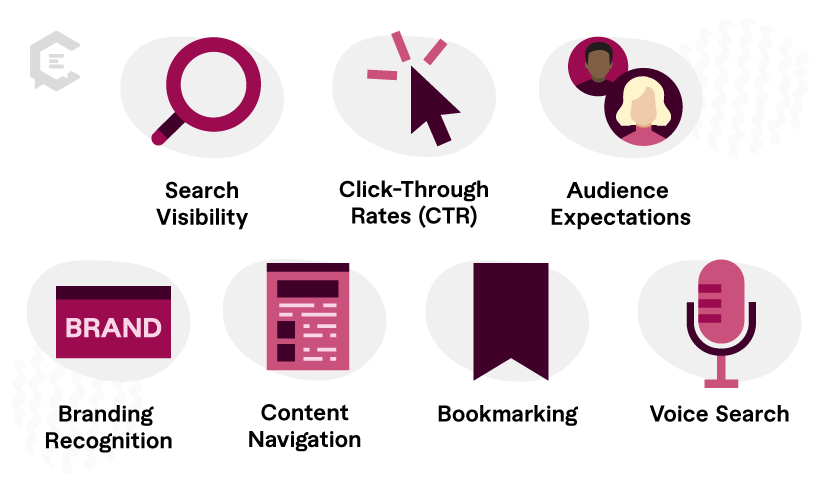What Is a Meta Title?
A meta title, also known as a title tag or page title, is an HTML element that defines the title of a web page. When you search on Google, the links you see in the results are meta titles. The meta title is one of the most important on-page SEO elements. It plays a significant role in helping search engines understand the content and context of a web page.
Meta titles, combined with your meta description, compel a user to click on your result in a search. Ideally, you’d have a carefully constructed meta title for each of your website’s pages. It’s your first chance to tell search engines and other entities what your page is about.
Google and other search engines aren’t the only applications that use them. For instance, if you want to share one of your pages on Facebook or LinkedIn, they’ll pull in your meta title for the page preview. Browsers also use them in their tabs.
However, there’s an important thing to note about meta titles. No matter how perfectly optimized they are, Google may change them in their search results to a different bit of content from your page. Google can “read” your page to determine which part most closely matches a user’s query, then change your title (just on their search results page) to match.
Why are Meta Titles so Important?
Meta titles are a fundamental element of publishing your content. Investing time and effort into crafting compelling meta titles helps:
- Search Visibility: Meta titles are one of the primary factors search engines use to understand the relevance and context of a web page.
- Click-Through Rates (CTR): A well-crafted title can influence users to click on your link over others, increasing your click-through rate.
- Audience Expectations: The main goal of your title is to set clear expectations about the content of a page.
- Branding Recognition: By including your brand name in meta titles, you can reinforce your brand awareness and recognition.
- Content Navigation: Meta titles can play a role in organizing and structuring your content by offering users a quick overview to navigate your site better.
- Bookmarking: When users share your content on social media platforms or bookmark it, the meta title often becomes the default title for the shared link.
- Voice Search: Your meta title is the key to your site appearing when users use voice search technology like, Alexa.
A few best practices for writing meta titles
Meta titles are essential to your content’s first impression on visitors. These best practices can make yours more effective.
Length
Aim for a length between 50 to 60 characters. That ensures it displays in search results without getting cut off.
Keep it relevant
The primary goal of your meta title is to describe your page accurately. It should align with the content, giving users a clear idea of what to expect when they click the link.
Front-Load Important Keywords
Place the most important keywords or key phrases at the beginning of the title to ensure they’re visible in search results and grab users’ attention.
Make it Unique
Each web page must have a unique meta title. Duplicate titles not only confuse users, they also harm your SEO.
Add your Brand Name
If applicable, include your brand name in the title. It’s especially important for pages that relate directly to your brand. Adding your company name reinforces brand recognition and helps users associate the content with your business.
Avoid Overuse of Symbols or Special Characters
It’s pretty common to use symbols like dashes or pipes to separate elements within a meta title. But using them excessively can make the title appear spammy. That lack of authenticity can deter users from clicking.
Including a date
Information is constantly changing. Many industries rely on having the most topical data to help users make their decision. Including a date allows users to know the publication at a glance and select your site as the most up-to-date.
Examples of A Great Meta Title
When searching “payroll software for small business,” the following result appeared from business.org:
- “Best Payroll Software for Small Business 2025 I U.S. News”
The title is under 60 characters and includes the date and the brand name. At a glance, this site matches what we are searching for exactly.
Including the date lets your audience know that your information is relevant. Now, it may feel like a pain to update your meta titles every year. Luckily, SEO tools like Rank Math can add a variable that automatically updates the year for you. Amazing!
Another excellent example is this result for the query “How to buy a house”:
- “Buying a house in 2025: Step-By-Step I Rocket Mortgage”
Like our first example, they use the year, so we know it’ll be super up-to-date information. The title is also truncated and not a complete sentence. They maximized the number of characters while hitting the keywords needed to optimize searchability.
Ready to elevate your meta titles?
In summary, the meta title is an essential element of your content and SEO strategy. A well-optimized and relevant title improves your website’s visibility in search results and entices users to click through to your pages. Focus on being accurate, concise, and incorporating key data points found in most search queries.
If you need SEO-optimized content and compelling meta titles to go with them, talk to a content specialist at ClearVoice today and boost your brand visibility!





